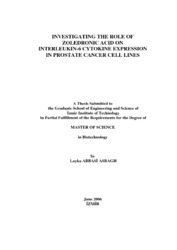Please use this identifier to cite or link to this item:
https://hdl.handle.net/11147/3430Full metadata record
| DC Field | Value | Language |
|---|---|---|
| dc.contributor.advisor | Doymaz, Fuat | - |
| dc.contributor.author | Abbasi Asbagh, Layka | - |
| dc.date.accessioned | 2014-07-22T13:51:31Z | - |
| dc.date.available | 2014-07-22T13:51:31Z | - |
| dc.date.issued | 2006 | - |
| dc.identifier.uri | http://hdl.handle.net/11147/3430 | - |
| dc.description | Thesis (Master)--Izmir Institute of Technology, Biotechnology, Izmir, 2006 | en_US |
| dc.description | Includes bibliographical references (leaves: 51-64) | en_US |
| dc.description | Text in English; Abstract: Turkish and English | en_US |
| dc.description | x, 64 leaves | en_US |
| dc.description.abstract | Prostate cancer (CaP) is a common disease in aged men. Androgen deprivation therapy is the first line treatment for advanced disease. Following this therapy, within few months CaP cells become androgen independent in a few mounths. The mechanism responsible for development of androgen-independent cancer is not known. Evidences suggest that growth factors and cytokines including Interleukin.6 (IL-6) cast a main role in this mechanism. IL.6 is an important cytokine on CaP progression. Bisphosphonates inhibit the proliferation and induce the apoptosis of certain prostate cancer cell lines, in vitro. However, their mechanism of action is not clearly understood. One possible mechanism might be the IL-6 mediated pathway. This relation between zoledronic acid (ZA) and IL-6 hasn.t been studied.The objective of this study is to evaluate the cytotoxic and apoptotic effect of ZA on hormone independent CaP cell line (PC-3) and to understand the relation of underlying mechanism of ZA-mediated cytotoxicity and IL-6 expression. PC-3 cells were treated with different concentrations of ZA. Drug-mediated cytotoxicity and apoptosis were determined. IL-6 levels were measured from the supernatants of PC-3 cells at 24, 48, 72 hrs.Maximum cytotoxicity was achieved at 90 and 100 .M of ZA. ZA produced the classical DNA ladders on gel synonymous of apoptosis. The decrease in IL-6 secretion was found to be statistically significant compared to controls. The decreasing effect of ZA on IL-6 expression might suggest a new mechanism of action of ZA's antitumor activity. This outcome may offer a novel therapy that utilizes IL-6 antagonists along with ZA in CaP patients. | en_US |
| dc.language.iso | en | en_US |
| dc.publisher | Izmir Institute of Technology | en_US |
| dc.rights | info:eu-repo/semantics/openAccess | en_US |
| dc.subject.lcsh | Prostate--Cancer | en |
| dc.subject.lcsh | Prostate--Cancer--Treatment | en |
| dc.subject.lcsh | Interleukin-6 | en |
| dc.title | Investigating the Role of Zoledronic Acid on Interleukin-6 Cytokine Expression in Prostate Cancer Cell Lines | en_US |
| dc.type | Master Thesis | en_US |
| dc.institutionauthor | Abbasi Asbagh, Layka | - |
| dc.department | Thesis (Master)--İzmir Institute of Technology, Bioengineering | en_US |
| dc.relation.publicationcategory | Tez | en_US |
| dc.identifier.wosquality | N/A | - |
| dc.identifier.scopusquality | N/A | - |
| item.openairecristype | http://purl.org/coar/resource_type/c_18cf | - |
| item.languageiso639-1 | en | - |
| item.openairetype | Master Thesis | - |
| item.grantfulltext | open | - |
| item.fulltext | With Fulltext | - |
| item.cerifentitytype | Publications | - |
| Appears in Collections: | Master Degree / Yüksek Lisans Tezleri | |
Files in This Item:
| File | Description | Size | Format | |
|---|---|---|---|---|
| T000552.pdf | MasterThesis | 2.74 MB | Adobe PDF |  View/Open |
CORE Recommender
Page view(s)
170
checked on Mar 31, 2025
Download(s)
74
checked on Mar 31, 2025
Google ScholarTM
Check
Items in GCRIS Repository are protected by copyright, with all rights reserved, unless otherwise indicated.